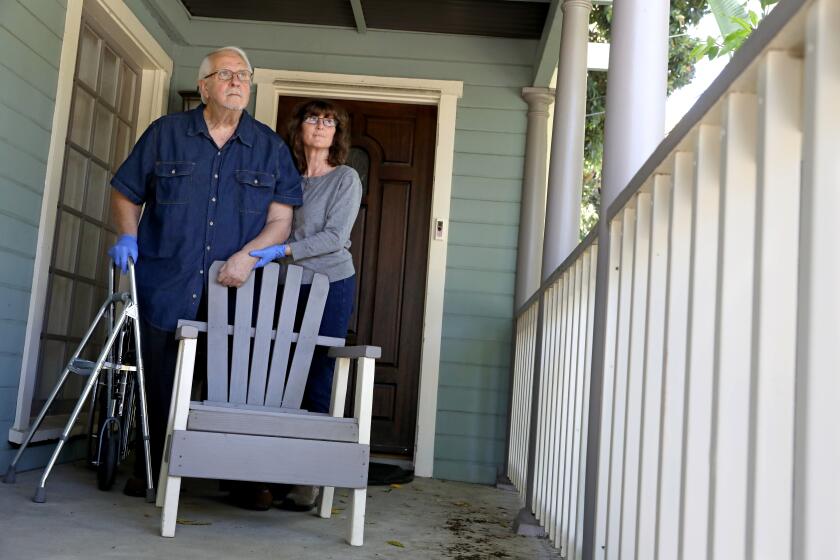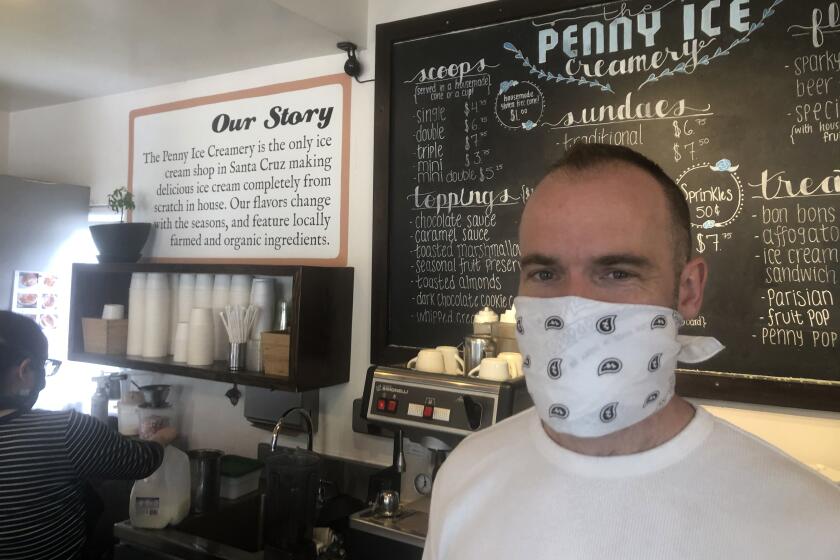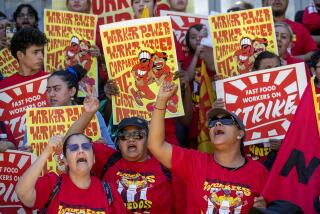âShake Shack loopholeâ stays in new small business bill. No one accepts blame
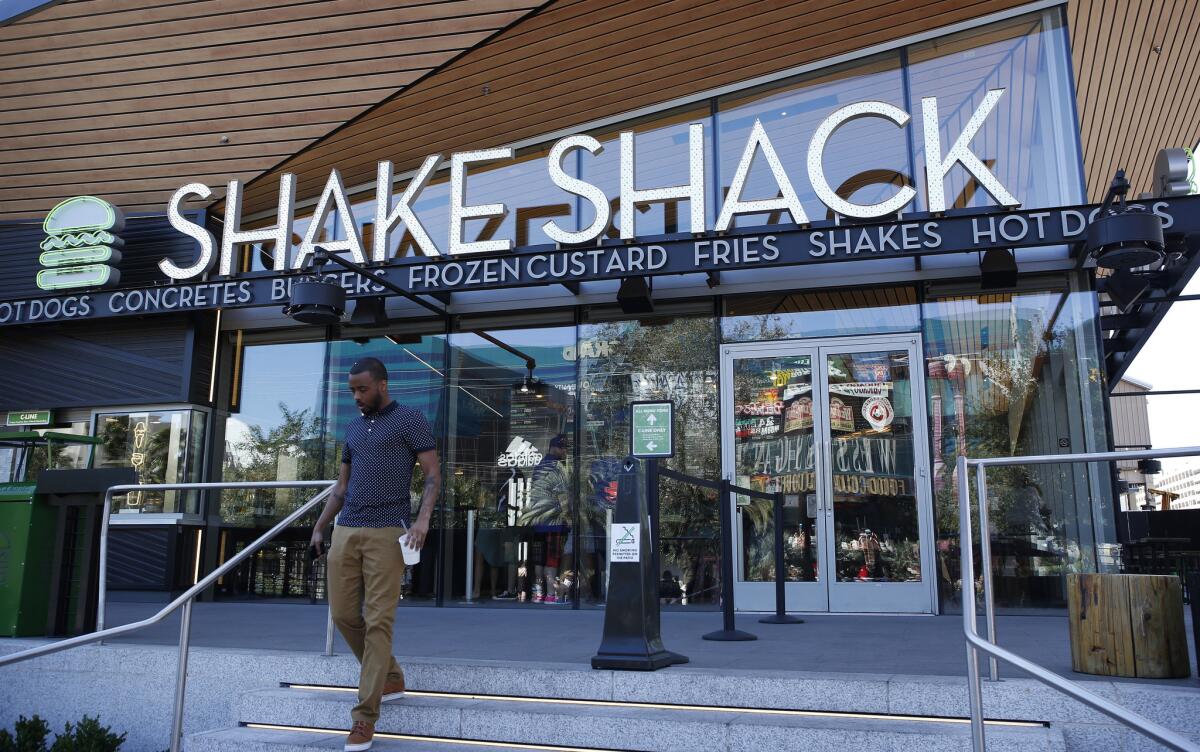
Itâs a classic Washington whodunit.
No one wants to take the blame for the loophole that allowed name-brand restaurant chains such as Shake Shack to get huge sums of pandemic-relief money meant for small businesses.
Lobbyists, lawmakers and agency officials deny responsibility. Yet fingers are pointing over how big national chains including Potbelly Corp. and Ruthâs Chris Steak House landed $10 million or more apiece in loans while millions of mom-and-pop firms were left stranded when the program ran out of money.
Now, with Congress poised to approve $320 billion of new funds this week, many lawmakers want the loophole closed. But a draft of the new legislation, obtained by Bloomberg, doesnât fix it. The Senate passed the measure Tuesday, and the House could vote Thursday.
Independent businesses struggle to survive as federal government fails to deliver payroll protection loans.
Still, some companies and Washington policymakers are rushing to recover in the face of bad press over the earlier round of small-business relief, with Shake Shack pledging to return its $10 million. Treasury Secretary Steven T. Mnuchin said heâd work to make sure big companies donât get money in the new bill.
He said the Treasury Department would issue guidance to clarify the certification process and requirements for companies seeking small-business loans under the new round of funding.
The culprit in the earlier bill was three words that made all the difference: âper physical location.â
âDuring the covered period, any business concern that employs not more than 500 employees per physical locationâ in the hospitality sector should be eligible to get a loan.
The language didnât clarify whether individual locations must apply for the aid or whether corporate headquarters could start vacuuming up millions in relief funds, nor did it necessarily apply solely to franchisees.
âWe have over a million companies that have received this with less than 10 workers,â Mnuchin said Tuesday at a White House briefing. He added, however, that âthere have been some big business that have taken these loans.â He said the Treasury will issue guidance to clarify the certification process and requirements for companies seeking loans destined for small businesses.
President Trump said at the briefing that he would ask larger companies to return money that was intended to help small businesses. âThey shouldnât have taken it,â Trump said. âAnd theyâre going to pay back that money.â
Mnuchin tweeted Monday and repeated earlier Tuesday that he was glad Shake Shack said itâs returning the funds it received.
Restaurant and hotel lobbyists concede they pushed for their industries to get special treatment but denied they were behind the language that opened the door to large firms. A key House Democrat blames Republicans, one of whom pins fault on the Treasury. Others say the measure was sought and approved by lawmakers from both parties to keep unemployment from swelling.
The PPP was supposed to save our small restaurants and businesses. But whereâs the money?
There was bipartisan support for including operators of multiple franchises who, though they fly the flag of a corporate brand â Marriott, for example â and get marketing support, are essentially independent small businesses.
âThe idea when this was passed was to bring as many small businesses as possible into this to help their employees,â Rep. Steve Chabot of Ohio, the top Republican on the House Small Business Committee, said in an interview. âThey are hurting just like everybody else is.â
The measure was âdesigned to put a floor under the restaurant and travel and hotel industries that are genuinely struggling, and the small businesses that so many of us are familiar with,â Democratic Sen. Chris Coons of Delaware said in a March interview with Bloomberg Television.
The now-infamous loophole is nestled in the Paycheck Protection Program, overseen by the Small Business Administration. The initiative was designed to throw a financial lifeline to businesses with fewer than 500 employees to help them keep workers on the payroll.
Shake Shack said Monday that itâs giving the money back and raising salaries for employees, while the operator of Ruthâs Chris Steak House said itâs keeping the funds and will follow the guidelines to maintain staff and paychecks.
A spokesman for Potbelly said Congress allowed funding for restaurants because their workers are âvital to our economy.â Fiesta Restaurant Group Inc., which said last week that its Texas Taco Cabana subsidiary received $10 million under the program, declined to comment beyond an earlier filing.
Initial proposals from the Treasury and Senate Republicans in March disappointed lobbying groups for the hotel and restaurant industries, as well as franchises, where big brands and chains are common.
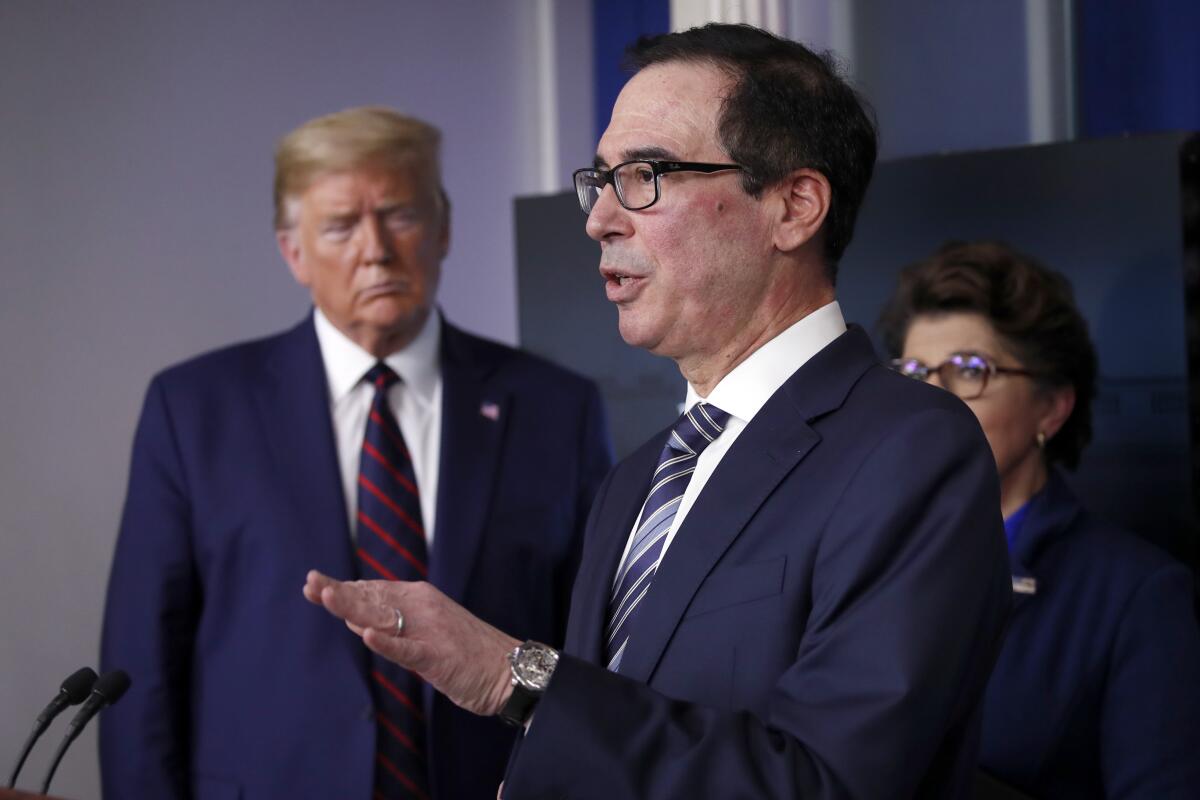
They argued that many independent franchises are de facto small businesses that were suffering as shutdowns spread across the country. The trade groups urged lawmakers crafting the provisions, particularly Republican Sens. Marco Rubio of Florida and Susan Collins of Maine, to make sure franchises and other hospitality businesses with multiple locations could access the funds.
âFor that laid-off server or line cook they donât care what logo is on their uniform,â said Sean Kennedy, executive vice president for public affairs for the National Restaurant Assn., one of the groups that lobbied for special attention. âThey are praying that their boss has applied for this so they can stay on payroll.â
The group, which represents thousands of restaurant owners and chains including McDonaldâs Corp. and Chipotle Mexican Grill Inc., was âpushing this message with anyone who would listenâ in the Treasury Department, at the White House and in Congress, Kennedy said. It first made the case for restaurant-specific aid in a March 18 letter, but Kennedy said the trade group didnât come up with the legislative language around locations.
A rise in coronavirus related lawsuits include gyms, colleges, airlines and cruise ships
Kennedy noted that despite the outcry over Shake Shack, food service and hotels together have represented less than 10% of the loans, according to the SBAâs numbers.
As the backlash heated up, House Republican leader Kevin McCarthy said Tuesday on Fox News that he had spoken to Mnuchin and Trump about going after âthose big companies that cheat the system.â
Rubio, who chairs the Senate Small Business Committee, tweeted Monday that he was trying to reach âindependently owned franchisesâ rather than âmultiple subsidiaries of a national brandâ and blamed the Treasury Department for issuing a rule for implementing the law that doesnât âreflect legislative intent & should be corrected.â
A Treasury spokesman didnât comment on Rubioâs contention that it was regulatory guidance that allowed the big chains to get the small-business loans, but said the department was looking at how to make the program better at reaching its intended recipients.
Guidance from the Treasury Department may be the only way to change the program in the near term. Although Congress is close to voting to replenish the programâs funds, with most members sheltering in place, lawmakers will need to take up the narrowest bill possible in a âpro forma sessionâ to win approval by unanimous consent.
Rubio said Monday that his committee would conduct âaggressive oversightâ of the Paycheck Protection Program this fall, including using subpoena power to determine whether companies made false certifications to obtain loans.
In a tweet Tuesday, Sen. Martha McSally, an Arizona Republican, blamed âbig banksâ for allowing bigger companies in on a program despite their advantages over small firms in accessing capital and urged âbetter oversight and transparency.â
Rep. Nydia M. Velazquez, a New York Democrat who chairs the House Small Business Committee, faulted Republicans for the loophole. âI can promise you that was not the languageâ Democrats proposed, she said in an interview. She said she opposes major chainsâ use of the PPP because the program wasnât intended to be a âbailout to the wealthy and well-connected.â
A relief fund for small businesses amid the coronavirus crisis has wound up helping companies with thousands of employees and past regulatory run-ins.
The money âhas to go to the small businesses, Main Street businesses, businesses in underserved communities, women-owned businesses,â minority-owned businesses and those in rural America, she said.
The American Hotel & Lodging Assn. pointed out that funds are also going to industries that have suffered fewer consequences from the pandemic, such as the construction sector, said Brian Crawford, the groupâs executive vice president of government affairs.
The International Franchise Assn. said that groupâs goal was to make sure âthat independent franchise owners should be treated the same as every other business owner,â said Matt Haller, the groupâs senior vice president for government relations.
âWhat was unexpected is that so many businesses of all sizes would be stuck on the outside looking in,â Haller said.
More to Read
Inside the business of entertainment
The Wide Shot brings you news, analysis and insights on everything from streaming wars to production â and what it all means for the future.
You may occasionally receive promotional content from the Los Angeles Times.
